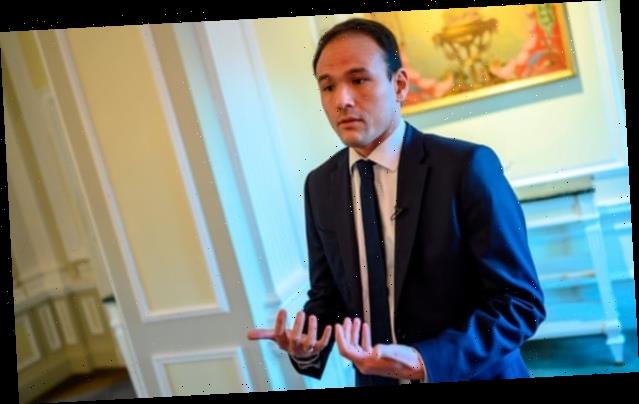France will go ahead with its controversial new tax on the profits of large technology firms such as Google and Facebook despite US threats to retaliate, as the government vows that it is just the start of a crucial rethink of the regulation of tech monopolies.
Cédric O, the French junior minister for digital affairs, told the Guardian that Emmanuel Macron’s drive to make companies including Amazon and Apple pay more and fairer tax would go ahead, despite US warnings that it could open up a new front in the international trade war.
Washington has threatened to retaliate with tariffs of up to 100% on imports of French products such as champagne, cheese, handbags, lipstick and cookware worth $2.4bn (£1.8bn) after a US government investigation found that France’s new digital services tax would harm US technology companies.
A decision on tariffs is expected in the coming weeks, but O said: “We will not withdraw the tax, that is certain. We think retaliation measures are not good for either the US, France or businesses concerned and they could lead to a reaction from the European Union.”
France is to become the first major economy to impose a tax on internet heavyweights. Dubbed the Gafa tax – an acronym for Google, Apple, Facebook and Amazon – the legislation will impose a 3% levy on the total annual revenues of the largest technology firms providing services to French consumers. President Macron has called it a “fairer” response to internet giants who are are currently able to book profits in low-tax countries like Ireland and Luxembourg, no matter where the revenue originates. Donald Trump has called it “foolish” and threatened revenge. France has argued that the tax is aimed at all tech firms and not just American ones.
But O said the tax, although “politically symbolic and democratically important”, was just the tip of the iceberg in terms of new regulations that must be introduced internationally to deal with the powerful tech giants, which he warned had gained a vast footprint on global economies, threatening democracy and risking a public health crisis over hate speech.
O said internet and technology regulation was now a major part of French soft power on the international diplomatic stage. He said the domination of a tiny number of tech giants on the way people search for information, communicate and interact was now challenging public power and nation states. France is not the only country that has devised a tax on tech firms – the UK is considering its own measures. But France, which wants the OECD club of rich countries to lead on tech tax issues, is now urging the EU and countries further afield to look closer at regulation.
O said tech giants, as monopolies, now presented a democratic challenge to governments. “Certain tech platforms have become the building blocks of our economy and democracy,” he said. “They have acquired a monopoly position today which gives them a footprint no other company has on the economy, so they need to see specific regulations applied … A company which has 1.4 billion citizens on its social networks can’t be treated like just any other company, with the same rules. A company that is the only search engine or messaging platform can’t have just the same rules as any other private company.”
He said ideas being discussed internationally could include special regulations for tech giants, making large tech companies share their data or services, or limiting acquisitions.
Current rules were inadequate and had to be updated, he said. “Right now, we have a body of regulations that were thought up in the industrial age and struggle to adapt to the data economy.”
O said addressing online hate speech was also key. “Hate speech is a global public health problem,” he warned. “The rise in online hate speech creates a major difficulty for public powers: we don’t know how to protect our citizens online in the same way we protect them in real life. If I threatened to kill you or your children in the street, I’d face police. But that doesn’t exist online. It’s both a public health issue and a problem for democracy, because if people think we can’t protect them, they will vote for others who they think – rightly or wrongly – can protect them.”
He added: “If the only countries that know how to successfully regulate hate online are authoritarian, non-democratic countries, that is a problem for democracies and progressive governments.”
Too big to fail? Tech’s decade of scale and impunity
France is currently debating a tough new law against online hatred aimed at wiping out racist and homophobic trolling, but there have been rows in the French senate over whether hateful content should be taken down from a social network site within 24 hours.
O said he felt people’s concerns over the impact of big tech giants in daily life had played a role in citizens’ protest movements recently. He said the town-hall debates held in France after the gilets jaunes (yellow vests) anti-government protests had shown there was concern over not just tech giants paying enough tax, but the new online economy and its impact.
“Some think the world is developing fast and abandoning them, and tech can be part of that fear – whether it’s online commerce, with small businesses closing, the Uber-isation of working patterns, or people questioning how a growing number of decisions are taken by algorithms that no one understands.”
He said: “There are views that technology has gone from a utopia, where the internet was presented as solving all our problems, to a type of dystopia, which is just as irrational. This is particularly present in France, which has had a complex relationship with technology for the past decades. But it’s everywhere and we must address it.”
Source: Read Full Article
